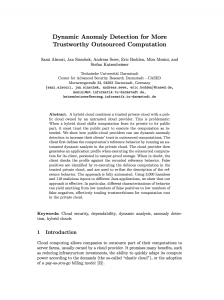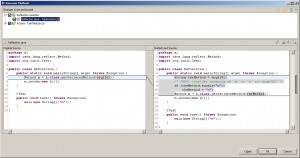In a new publication for the Information Security Conference we describe how to securely offload computations from a private to a public cloud:
Abstract: A hybrid cloud combines a trusted private cloud with a public cloud owned by an untrusted cloud provider. This is problematic: When a hybrid cloud shifts computation from its private to its public part, it must trust the public part to execute the computation as intended. We show how public-cloud providers can use dynamic anomaly detection to increase their clients’ trust in outsourced computations. The client first defines the computation’s reference behavior by running an automated dynamic analysis in the private cloud. The cloud provider then generates an application profile when executing the outsourced computation for its client, persisted in tamper-proof storage. When in doubt, the client checks the profile against the recorded reference behavior. False positives are identified by re-executing the dubious computation in the trusted private cloud, and are used to re-fine the description of the reference behavior. The approach is fully automated. Using 3,000 harmless and 118 malicious inputs to different Java applications, we show that our approach is effective. In particular, different characterizations of behavior can yield anything from low numbers of false positives to low numbers of false negatives, effectively trading trustworthiness for computation cost in the private cloud.







